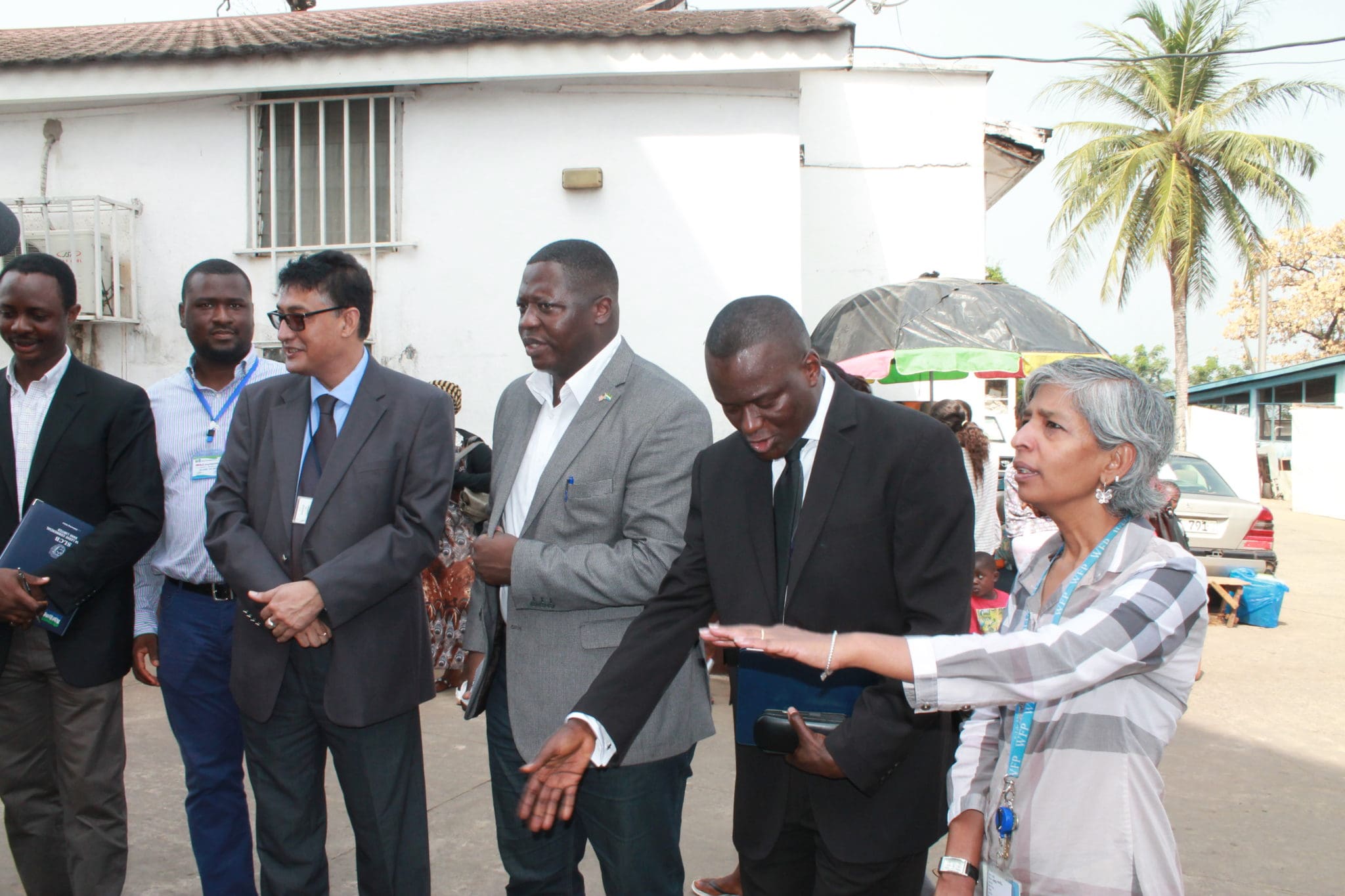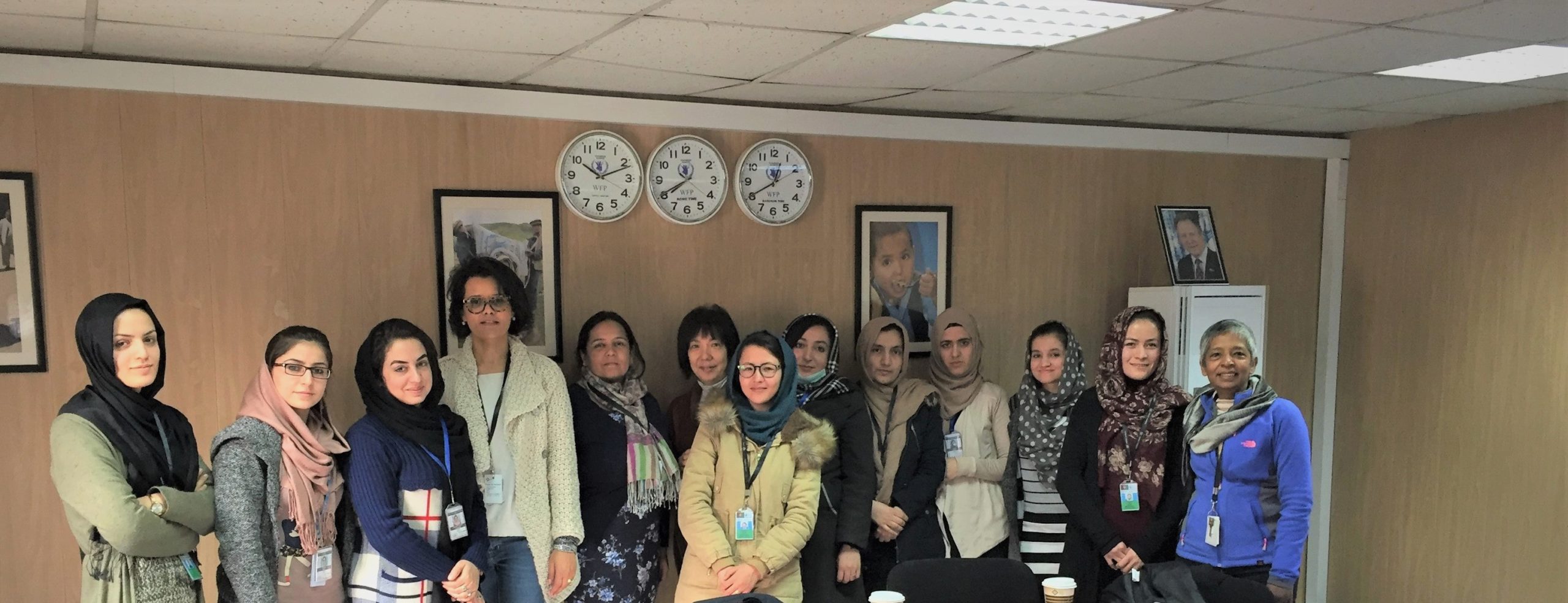
Parvathy Ramaswami during her mission in Sierra Leone in 2015 (Photo: Parvathy Ramaswami)
This time our conversation with female negotiators with outstanding humanitarian careers took us to Afghanistan where we had the pleasure of talking to Parvathy Ramaswami, Acting Humanitarian Coordinator and Deputy Country Director for WFP in Afghanistan. The conversation focused on how linguistic and cultural skills, as well as a united team, can be an essential factor to gain legitimacy in the face of the counterpart.
Parvathy studied mass communication after her first Masters’ degree and started her career as a research associate visiting rural areas around New Delhi and the state of Haryana. After completing her university degree, she worked on a few UNICEF projects and traveled to different parts of India, a work that fascinated her. This experience motivated her and inspired her to pursue work in the development aid sector, and when an opportunity came up to work with a private-sector consulting company that provided development consultancy to government, non-government and international organizations, she didn’t hesitate to take up the offer.
Joining WFP was the next logical step, so that’s what she did in 1996. Soon enough she started working on disaster response and other humanitarian projects around the world. In August of 2019, she moved to Afghanistan. Today, she works as the humanitarian coordinator officer in charge. This means she now deals with access issues that concern the overall humanitarian community in Afghanistan, not just WFP.
The value of speaking a local language
Parvathy doesn’t believe that being a woman has posed any challenges for her when negotiating, she believes that speaking the local language and being conscious to respect local cultural norms have always been more important factors in relationship with her counterparts than her gender. The only thing she has noticed is that sometimes her counterparts don’t look her in the eye. “But I never felt that they weren’t listening to me, or not taking into account my arguments. I think they noticed that I was very persistent and tenacious since I would come back to the same point every 10 to 15 minutes during the negotiation. It was clear to them that I wasn’t giving up,” emphasized Parvathy.
She believes that being able to answer any question your counterpart might have is what makes a difference. And the confidence to do so comes from facts and evidence. She also points out, however, that a negotiator’s demeanor and the way they show respect towards their counterpart is crucial. For example, in Afghanistan, it is customary, when you meet people in public space, to cover your head, and when in the discussion, allow people to finish speaking.
Transparent communication in negotiation, that is, communicating in a way that doesn’t look down on people, is also essential. “Including the affected population in an emergency response and consulting them on their needs makes a big difference,” says Parvathy. She always makes sure to explain what her organization is as well as its purpose. “The fact that people saw us walking around places that were knee-deep in water and clearing WFP cargo at the railway stations during the cyclone response in Odisha, made the local population see our support,” added Parvathy.
More importantly, she believes that speaking a local language has given her greater access to vulnerable populations. When she was working in Sri Lanka, speaking Tamil allowed her to have open and direct communication with the affected population. She mentioned that people would naturally reach out to her and talk about living in an area controlled by the Liberation Tigers of Tamil Eelam (LTTE).
But it was during a negotiation with a couple of senior Taliban leaders in Afghanistan that she realized just how valuable her linguistic and cultural background was. When she told them she grew up in the north of India, the Taliban leaders started talking to her in Urdu. “We talked about food and what I liked about Afghanistan, such as the pomegranates and the figs, or dried fruits, like badams (almonds). For me, this conversation changed the flavor of the interaction,” explained Parvathy.
On the other hand, speaking a local language also indicates to her counterpart that she is keeping her eyes and ears open. This means that her counterpart could assess her position of power in the negotiation differently, or that she will be more sympathetic with them. She believes that building a rapport is very different when you converse in a local language with your counterpart.

Parvathy Ramaswami with WFP’s female staff in Afghanistan in 2018. (Photo: Parvathy Ramaswami)
A united front
In Parvathy’s experience, the counterpart will look at the strength of the team in terms of what it brings to the table, that is, the content, the principles, and the red lines. And not so much at the fact that they are negotiating with a woman.
However, she added, when teams are comprised of both men and women, but team members don’t value women and men equally, the other party can notice it and use it to undermine what the women in the team say.
“That’s why it’s very important to clarify each team member’s role and feed off of each other’s strengths, rather than competing. It’s very important to show unity, cohesion, and equity among team members,” highlighted Parvathy.
Pay it forward
Parvathy’s first mentor was her boss at the development consultancy. She taught her a lot from her practical experience working for the Danish International Development Agency (DANIDA).
But she hasn’t been the only one. Throughout her career, Parvathy has met many people who have acted as mentors for her. They were people with whom she could brainstorm ideas, who would offer options and never judge her for her views but ask her questions that would make her think differently.
Parvathy has always had that kind of support, and in her work with WFP, she has strived to pass on what she has learned to young people. “My mentors always supported me, allowed me to learn, and we’re always transparent, never withheld information, be it positive or negative. And of course, they always checked on me to see how I was feeling,” explained Parvathy.
Keep an open mind
“What I consider the most important quality [in a humanitarian] is open-mindedness,” said Parvathy. Her advice for young women starting in the humanitarian field and being sent to negotiate on the frontlines is listening. For her, being able to understand different perspectives, and not jumping to conclusions too quickly, is what makes a good humanitarian.
Another piece of advice she gave is: “Don’t be afraid. Your counterparts are human beings, just like you. They may do things you disagree with, but there shouldn’t be any fear,” detailed Parvathy.
Overall, Parvathy sees humanitarian assistance as a very interesting area of work. She knows it can be difficult because very often you have to improvise, and you can’t always be prepared. “There are a lot of nuances and human emotions. This is something you really have to grow into and discover that side of yourself. Results come slowly,” explained Parvathy.
Empathy and humanity are essential
“I think the lack of diversity comes from the way we source people to be recruited. It’s not only about recruiting diverse people, but it’s about hiring people who can embrace diverse views,” emphasized Parvathy. For her, organizations can tick the requirements by having the right number of women and men from diverse nationalities, but that doesn’t guarantee that people will be open and amenable to different perspectives.
Parvathy considers that paying attention to behavioral competencies and assessing candidates based on those qualities, along with their technical skills, is crucial.
“If you really want to improve diversity and inclusion in humanitarian organizations, then you need to bring people on board who have empathy and humanity and it’s not just lip service,” stressed Parvathy.
Talk to women
Lastly, Parvathy emphasized the importance of talking directly to women who are affected by conflict. To be able to truly assess women’s needs, it’s important to have direct access to them and not get information from third parties.
“We need to know whether women want to educate their girl-child or earn income, or to have better health facilities,” explained Parvathy. For her, reaching women, especially in countries in conflict, is essential to get to a better perspective.
